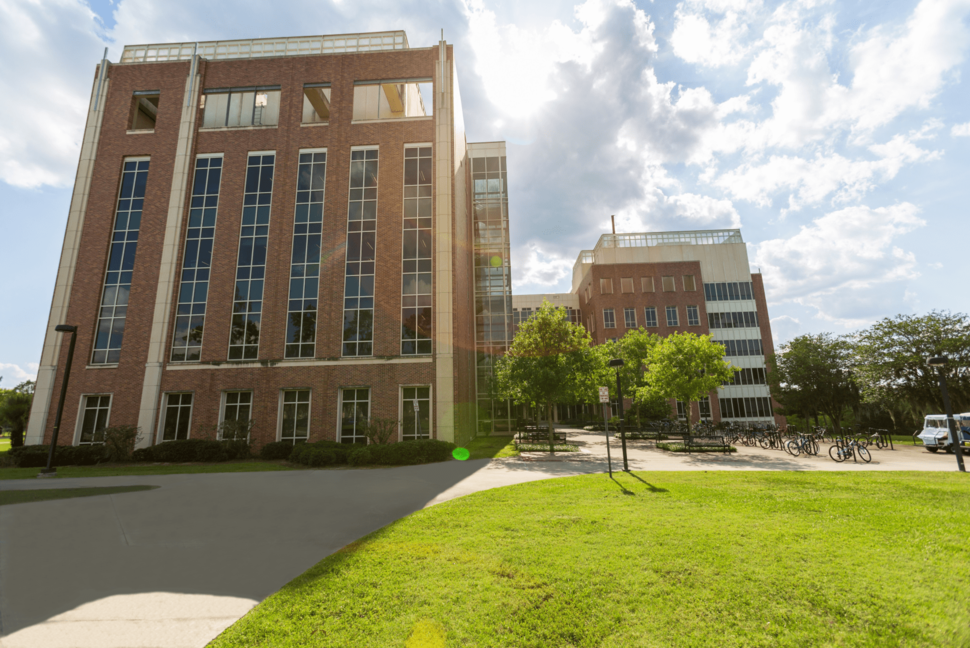
University of Florida Health Cancer Center
Clinical Cancer Center
Jonathan D. Licht, M.D., Director
Gainesville, Florida
Main:
352-273-8010
The University of Florida Cancer Center was founded in 1992, and received NCI designation in 2023. The cancer center serves north central Florida, a geographically large region with the highest rates of cancer mortality in the state. The center is the only NCI-Designated Cancer Center based at a public university in the state of Florida. The geographic area from which the center attracts patients has high rates of poverty; rurality; and food, housing, and medical care insecurity. To address the cancer burden of the region, the center blends comprehensive patient care and innovative research in a collaborative, multidisciplinary environment, drawing members from 11 of the 16 colleges at the University of Florida (UF). Members work as researchers and clinicians at the University of Florida and UF Health, the Southeast’s most comprehensive academic health center on the main campus of one of the nation’s top five public research universities and the flagship public university of the state of Florida.
The UF Health Cancer Center is dedicated to providing leading-edge cancer care and conducting original research to prevent, detect, treat, and ultimately cure cancer while addressing the unique challenges of the cancer burden faced by the population it serves.
Research at the UF Health Cancer Center
The UF Health Cancer Center is committed to the full spectrum of cancer-relevant research, with a focus on interdisciplinary basic discovery and translational research and the pursuit of scientific endeavors that have near-term clinical applications. The center’s clinical trial portfolio is strongly focused on investigator-initiated trials born from UF scientific discoveries and observations.
The center’s research strengths include cancer communication and prevention, tumor virology and the microbiome, and cancer immunotherapy. The center’s innovative approach to community engagement includes involving the community as partners in research through a novel citizen scientist program and using big data to address key research questions, such as the needs of the aging population. The center has a robust cancer research education program that serves the high school through faculty levels, including the only team-based cancer research program in the NCI portfolio.
Select Scientific Initiatives at the UF Health Cancer Center
The research priorities of the cancer center cut across and align with its four research programs:
- Cancer Control and Population Sciences: The mission of this program is to reduce the cancer-related burden in the cancer center catchment area by conducting research to improve cancer prevention, treatment, symptom management, and palliative care. Distinctive contributions of this program include customized virtual health assistants to engage patients in screening and prevention behaviors, which were created through a partnership between population science researchers, communication specialists, and computer scientists.
- Cancer Targeting and Therapeutics: The mission of this program is to accelerate discovery, development, and clinical translation of targeted small molecule and bio-therapies. This program leverages leading-edge technology such as robot-assisted drug discovery at The Herbert Wertheim UF Scripps Institute for Biomedical Innovation & Technology to complement pharmacogenomics research at UF.
- Immuno-Oncology and Microbiome: The mission of this program is to improve cancer outcomes through innovative therapeutic research on microbiome-immunotherapy interactions influencing epithelial and immune cell function, engaging clinicians and basic scientists to partner on investigator-initiated trials. The program develops and translates immunotherapy modalities, such as RNA-based vaccines, adoptive cellular therapies, genetically modified T cells and microbiome-based therapy, into first-in-human studies.
- Mechanisms of Oncogenesis: The mission of this program is to identify and understand cellular pathways that are dysregulated during neoplastic transformation and to develop methodologies to target these cancer-specific signaling events. This program has a strong focus on abnormal chromatin and gene regulation in cancer, the biology of RNA processing in cancer, and tumor virology.
* Information on this cancer center profile was provided by UF Health Cancer Center.